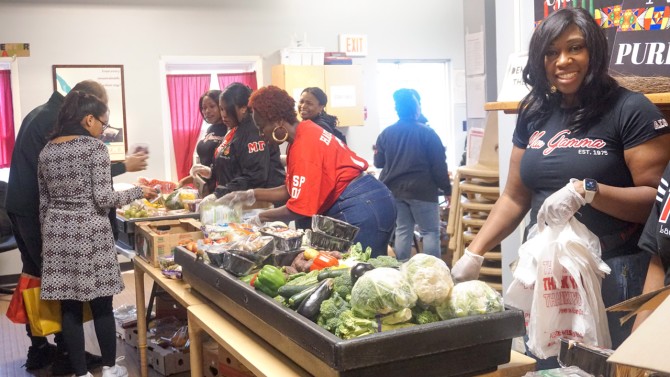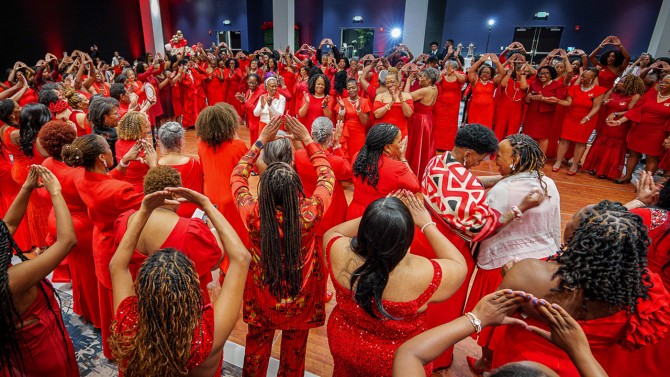
The Mu Gamma chapter of Delta Sigma Theta Sorority pose for a group photo on May 4 outside Willard Straight Hall for Songfest, an event where members gather to sing and celebrate their history and sisterhood.
The women of Mu Gamma celebrate 50 years of mentorship
By Laura Gallup
A few months after Shelby Williams ’25 became a member of Delta Sigma Theta (DST) Sorority, Inc., she was in Boston for a summer internship and was able to have lunch with an alumna of Mu Gamma – the Cornell chapter of the sorority.
“It gave me an added sense of security knowing that there are Deltas and chapter sorors all over the country who I can connect with and rely on if I ever need anything,” said Williams, a recent graduate and government major and a Robert S. Harrison College Scholar in the College of Arts and Sciences (A&S).
More than 100 Mu Gamma sisters, from founding members to current undergrads, gathered May 2-4 in Ithaca to celebrate the chapter’s 50th anniversary, and a tradition of service, scholarship and sisterhood at Cornell.
“You have to know the history and the foundation and what was important and why we did the things we did,” said Linda Gadsby ’88, a Mu Gamma alumna and a member of the Cornell Board of Trustees who chairs the board’s Committee on Student Life. “Then you understand how you are expected to add to this legacy.”
For more than five decades, the Mu Gamma chapter has continued to develop members into leaders. Members gain hands-on experience that builds real-world skills, from planning and hosting events to managing budgets and securing grants.
“It really is like running a small business when you’re running the chapter here on campus,” said Gadsby, the senior vice president, general counsel and chief diversity, equity and inclusion officer for the National Board of Medical Examiners. “Even if you were a leader before, it really does ratchet up those skills. It turbocharges your leadership capacity.”
The most recent chapter president, Cyan Crayton ’25, who just graduated with a biological sciences degree, led a study group for molecular and cellular biology. She also previously served as a Cornell club team tennis captain, was a fellow for the Black Student Empowerment office and the president of Cornell’s Multicultural Greek and Fraternal Council.
“Being a member of such a magnificent chapter gives you perspective on what can be done,” Crayton said. “You can see the potential of what the future can hold, which gives you a larger scope than I think your average student has.”
DST is part of the “Divine Nine,” the nine historically Black Greek-lettered fraternities and sororities formed in the early 20th century to address the social, political and economic needs of Black students at a time when they were often excluded from fraternities and sororities.
Membership in all of Cornell’s fraternities and sororities, including Mu Gamma, is open to anyone.
Mu Gamma is the second DST chapter to be established at Cornell. The first was the Theta chapter, created on Nov. 25, 1920, just months after women won the right to vote.
But that early chapter wouldn’t last. Due to a lack of Black student enrollment, the harsh racial climate of the time and a lack of support from the administration, the Theta chapter was dissolved in the late 1920s.
In May 1975, 15 Ithaca College students established the Mu Gamma Citywide Chapter, seeking to cultivate sisterhood among Black women and serve the Ithaca community. In 1976, the chapter expanded to include members from Cornell, eventually extending its outreach to the surrounding area, including Wells College.
Intergenerational bonds were on full display at the 50th anniversary celebration. The events included a public talk with scholar and Mu Gamma alum Kimberlé Crenshaw ’81, a professor of law at the University of California, Los Angeles School of Law and at Columbia Law School, and Carole Boyce-Davies, professor emerita of Africana Studies and Literatures in English, discussing “The Politics of Black Womanhood: Reflecting on 2024 and Beyond.” Many members got to meet Mu Gamma founders they had only ever heard about, treating them, Gadsby said, “like rock stars.”
“I was so excited to hear from members across the decades and learn about their experiences,” said Williams, who led planning efforts for the 50th anniversary. “It’s about connecting us to our shared history and mission.”
During the weekend, the sorority participated in an event, “Food for the Soul: A Community Health Fair,” at Southside Community Center in Ithaca, where health organizations participated and attendees were offered free meals, groceries, personal care items and wellness checks.
Community service has been an integral part of the Mu Gamma leadership. The chapter has long worked with local organizations such as Calvary Baptist Church and the Greater Ithaca Activities Center. Each year, Mu Gamma members support food pantries, host family programming and scholarships, including the Rosario Alvarez Memorial Fund, which is awarded annually to an exceptional graduating senior from Ithaca High School.
Today, with 13 collegiate members during the spring semester, the chapter is thriving. Current members say that’s in large part to the steadfast support of Mu Gamma alumni.
“Our engagement and involvement with the organization is a lifetime commitment,” said Gadsby. “It’s not just a campus organization; we continue our work even after we leave Cornell.”
Anastacia Assenso ’25, who recently graduated with an international labor and relations major in the ILR school and was the chapter treasurer, said her connection with alumni has been essential in shaping her Cornell experience – especially as a first-generation college student.
“It has been really moving and empowering,” Assenso said. “It really reassured, for me, that there are always people who I can go to when I’m in need of help or advice.”
Laura Gallup is a communications lead for Student and Campus Life.
Media Contact
Get Cornell news delivered right to your inbox.
Subscribe


